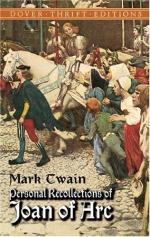Chapter 7 Our Paladin in His Glory
We were doomed to suffer tedious waits and delays, and we settled ourselves down to our fate and bore it with a dreary patience, counting the slow hours and the dull days and hoping for a turn when God should please to send it. The Paladin was the only exception—that is to say, he was the only one who was happy and had no heavy times. This was partly owing to the satisfaction he got out of his clothes. He bought them at second hand—a Spanish cavalier’s complete suit, wide-brimmed hat with flowing plumes, lace collar and cuffs, faded velvet doublet and trunks, short cloak hung from the shoulder, funnel-topped buskins, long rapier, and all that—a graceful and picturesque costume, and the Paladin’s great frame was the right place to hang it for effect. He wore it when off duty; and when he swaggered by with one hand resting on the hilt of his rapier, and twirling his new mustache with the other, everybody stopped to look and admire; and well they might, for he was a fine and stately contrast to the small French gentlemen of the day squeezed into the trivial French costume of the time.
He was king bee of the little village that snuggled under the shelter of the frowning towers and bastions of Courdray Castle, and acknowledged lord of the tap-room of the inn. When he opened his mouth there, he got a hearing. Those simple artisans and peasants listened with deep and wondering interest; for he was a traveler and had seen the world—all of it that lay between Chinon and Domremy, at any rate—and that was a wide stretch more of it than they might ever hope to see; and he had been in battle, and knew how to paint its shock and struggle, its perils and surprised, with an art that was all his own. He was cock of that walk, hero of that hostelry; he drew custom as honey draws flies; so he was the pet of the innkeeper, and of his wife and daughter, and they were his obliged and willing servants.
Most people who have the narrative gift—that great and rare endowment—have with it the defect of telling their choice things over the same way every time, and this injures them and causes them to sound stale and wearisome after several repetitions; but it was not so with the Paladin, whose art was of a finer sort; it was more stirring and interesting to hear him tell about a battle the tenth time than it was the first time, because he did not tell it twice the same way, but always made a new battle of it and a better one, with more casualties on the enemy’s side each time, and more general wreck and disaster all around, and more widows and orphans and suffering in the neighborhood where it happened. He could not tell his battles apart himself, except by their names; and by the time he had told one of then ten times it had grown so that there wasn’t room enough in France for it any more, but was lapping over the edges. But up to that point the audience




